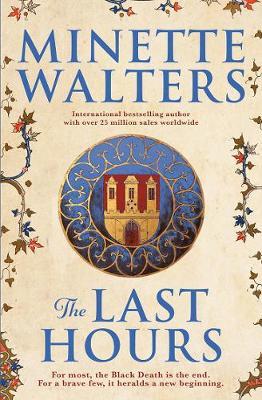Last hours by Minette Walters

Allen and Unwin, 2017. ISBN 9781760294984
(Age: secondary to adult) Highly recommended. Themes: Crime, Black
Death, Medieval life and times, Murder. Long time crime fiction
writer; Minette Walters, has turned to historical fiction in this
new book, destined to be a series about the advent of the plague in
rural England in the fourteenth century. Set in the small community
of Develish, where Lord Richard rules with an iron fist, some two
hundred serfs farm the strips of land outside the manor walls, owing
allegiance to their lord in the sharing of grain and produce from
their labour. His wife, Lady Anne hates her husband and is in daily
conflict with their haughty, spoilt daughter, Eleanor, but when the
plague comes to the village, the girl's spitefulness seemingly has
no bounds. When Lord Richard leaves for the neighbouring manor
house, there to trade his daughter in marriage his entourage is
racked by the pestilence that has moved over the county of Dorset.
He and a few of his retainers make it back to Devilish, but are
stopped at the moat. Hearing of the ravages of the disease, Lady
Anne has issued orders that no one will be allowed in, lest they
spread the plague to her people, now all crowded into the manor
house and its surrounds within the wall and the moat.
From here, Lady Anne manoeuvres her way into ruling the manor and
the villagers, nominating one of them, Thaddeus, as a steward, and
fighting the machinations of her daughter, those opposed to what she
is doing, the former steward recently hired by her husband, and
Thaddeus' lazy family. Having some two hundred people living
together, and knowing little of what is happening outside, a murder
causes intense concern and it is up to Thaddeus to unravel the
mystery. But it appears that Eleanor may be too close to the murder
for his comfort, so he takes the five young men implicated in the
affray and they leave the manor to look for food and information.
This is a wonderfully involving look at one community and its
attempts to keep the plague out of its midst. The minutiae of life
lived in such close confines, with people at once suspicious and
very fearful, struggling to fill their long days, each day seeing
the food supplies running down, and a priest who is little help,
shows readers what life for many must have been like in 1348 when
probably half of Britain's population died.
This story is a marvelous reconstruction of life in Medieval times,
recalling the harsh lives led by the serfs ad their families, owing
their lives to an insensitive, ignorant and over bearing man who
only sees them as his slaves. to do with as he bids.
A fascinating insight into the background of Walter's writing of the
book is given in this interview.
Fran Knight